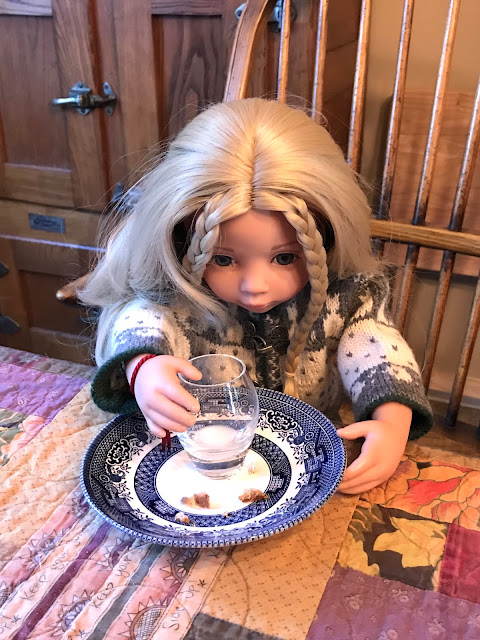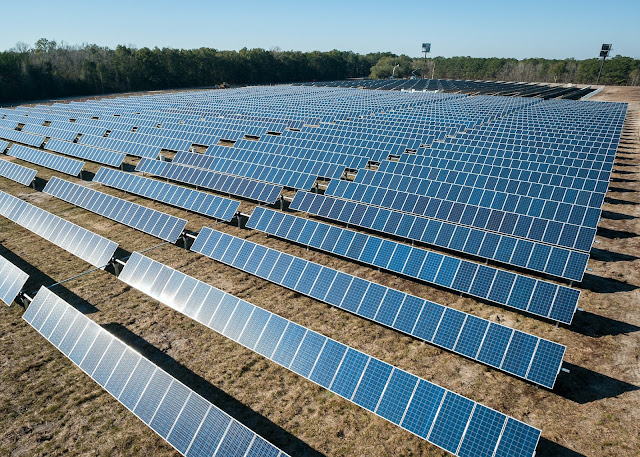Jolena was starting to feel better about her carbon footprint. Maybe it was having a snack with Mandy. As the dolls pretended to eat, she thought back over what Mandy had said.
"Our carbon footprint," Mandy had explained, "is how much we each change the earth's atmosphere by what we do." Mandy had said that lots of things we do can cause too much of something called greenhouse gases.
Mandy had pointed out that greenhouse gases cause the sun to warm up the earth, the way it warms up the air inside a greenhouse. The warmth goes in easily, but it doesn't get out quite as fast, so the air warms up.
Too much of these gases, though, can cause more extreme weather, like blizzards, hurricanes, tornadoes, floods, droughts and wildfires. The polar ice caps melt, and that makes the sea level rise.
"So why do you say I don't have to give up being on the ski team?" Jolena asked, as she pretended to chew. (One of the nice things about being a doll is, you can talk to other dolls and pretend to chew at the same time. That's hard for real children, who really should finish chewing before they talk.)
"The biggest way we can make a difference," Mandy replied, "is by using less of the fuels that are the biggest source of carbon in the air. For one thing, when you ride to practice, you're part of a carpool, right?"
Jolena nodded. All the dolls are picked up at their homes by one of the human people who run the ski program. That human person brings them home again. It isn't too far away, but too far to walk or ride their bicycles, and they have a lot of equipment they have to take with them. Even in the summer, when they don't have all those bulky clothes, they still have their skis, ski poles, goggles, helmets and boots.
"All the dolls you practice with live close by, don't they," Mandy asked munching to herself, "so you all can ride in one car?"
Again Jolena nodded, as she continued to pretend to chew.
"That means you're already saving some greenhouse gases by only using one car for all of you, and not driving very far" Mandy pointed out.
"One lady who drives you has an electric car, I think," Mandy went on, "so that saves some more of the carbon gases. Some electricity is made in ways that add to the greenhouse gases, but a lot of it now comes from wind, water and solar (SOH-ler). Solar means power made from sunshine."
Jolena agreed that was true. She hadn't thought about Mrs. Finkel's special car before.
"How do you fly to competitions?" Mandy asked, as she pretended to eat the last bit of her sandwich.
"At the airport," Jolena said, "we all get into our boxes with our equipment."
"Then they they put our suitcases in with us," Jolena explained, as she finished her sandwich. "The boxes get stacked inside a bigger box, and they put that box into the plane with all the human passengers' suitcases. We can't see where the plane is going, but we can talk to each other."
"Then your share of that plane ride is very small, too," Mandy pointed out. "Dropping out of the program wouldn't do much to help, but it's nice you want to help protect the earth."
"I don't want to quit the team," Jolena agreed, "but I do want to help!" Showing that she wanted to be a helpful doll, Jolena did as Mandy did and picked up her own dishes to take to the kitchen.
"No one doll can do it alone," Mandy said, as they put their dishes into the dishwasher, "but all of us can help. That's why it's good to know what our carbon footprint is and how we can make that smaller," Mandy explained. "If we make an effort to make our footprint smaller, we can still do the things that are really important to us."
"Now let's go over what we all need to do," Mandy concluded, "to cut down on having these gases go into the air. We're doing a lot of these things already, but we need human people to help."
Jolena nodded. She thought she was getting the idea.
"The more we use other kinds of energy instead of fuels like coal or gasoline to get where we need to go," Mandy pointed out, "the more we help. If we carpool with others, the way you do, we use less, but when we don't have so much to carry, and the weather is nice, we can walk or ride a bicycle instead of riding in a car," she said. "Then we're helping even more. We're using our own energy, and that's good for us, too, because it's exercise."
"Most houses where we live," Mandy explained, as the dolls walked toward the hall, "are heated with gas. If we keep the temperature of the house a little lower, we use less, and that helps." She pointed up to the thermostat (THER-muh-stat), the thing on the wall that said at what temperature the furnace was set.
"Then there are all the ways," Mandy said, continuing down the hall toward the stairs, "that human people can make energy without causing the earth's atmosphere to keep heating up."
"Companies that sell electricity are starting to make their power to sell using ways that don't add carbon gases to the air," Mandy went on. "Human people have invented something called solar panels, which make electricity from the energy in the sun's rays."
"I've seen those," Jolena said. "Human people sometimes even put them on their roof."
"Yes," Mandy agreed. "They also can set them up in a big field where there's nothing to block the sun's rays all day. They call those solar farms, because they use the sun's rays to grow power the way a farmer uses the sun's energy to grow crops."
"Windmills have been used for a long time," Mandy continued. "The wind turns big propellers that are attached to big machines that change the wind energy into electricity the way a pinwheel turns when you blow on it."
"I know what pinwheels are," Jolena said. "We made them in school."
"The windmills are much bigger," Mandy explained. "Sometimes there is just one for someone to use, but often there are wind farms set up someplace where nothing blocks the wind. They make electricity to sell, just like the solar farms."
The dolls had reached the stairs. "Wind," Mandy pointed out, as they started to climb, "is made by the natural heating of the earth's atmosphere by the sun. It's cooler in places where the sun doesn't reach. The cooler air is heavier, so it sinks. The warmer air rises. That movement causes the wind. The best part," she added, "is we will never run out of wind, and the energy made from it is clean. It doesn't add any carbon gases to the air."
"I feel the wind," Jolena said, "when I do my tricks on skis. I have to figure out what to do to spin around in it and land correctly. You can't see it, but you can feel it."
"Yes," Mandy agreed, "and human people have also used water's energy to make electricity for a long time. It works the same as a windmill, but using water. Water runs downhill toward the ocean along streams and rivers. Human people can build a big wall called a dam in the path of the water. They make a place for the water to go through, and they use that water's energy to make electricity."
"Those," Mandy concluded, "are some of the important ways we can make energy without adding carbon gases to the air, but there also are ways that these gases can be removed from the air," Mandy went on. "Human people have invented a way to remove the carbon gases when they make power from fuels that release it. It's very new, and not much of it is being done yet."
"Nature," Mandy said, "has given us a way already to take the carbon gases out of the air since long before there were even any human people on the earth: trees. Trees breathe in the carbon gases, but they take a long time to grow big enough to make a difference, so we shouldn't cut them down if we don't have to."
"Paper is made from trees," Mandy explained, "so we can put waste paper in the recycling bin instead of the trash, so it can be used to make new paper and we don't have to cut down as many trees."
"Yes!" Jolena exclaimed. "We always put all our used paper into a big bin, unless it's dirty, like from food or pretending to blow your nose."
"Yes," Mandy agreed. "That paper can be reused. It still takes energy to make it useable, but it saves the trees."
"We recycle cans and bottles, too," Jolena said. "Does that help?" She remembered when the dolls took all the cans and bottles back to the store and got money for them. She got to be the one who went with The Writer, and she got to give the store person the slip of paper that showed how many bottles and cans they had returned in the machine.
"Yes, it helps," Mandy assured her. "The less stuff human people have to make new, the less greenhouse gasses are added to the air. Most of the things made in factories add greenhouse gases to the air."
"Like dolls," Jolena said sadly, "Maybe human people shouldn't buy so many dolls."
Mandy laughed. "Whenever you think about how much harm something does, you also have to think about how much good it does," she reminded Jolena. "Some things are worth it. Dolls teach human children how to care for others. When they learn to care for other human beings, they then start to care about animals and plants. That teaches them to care about the earth. Human people definitely need to keep making dolls."
"Maybe they need to make even more of us," Jolena pointed out solemnly.
 |
"Maybe so," Mandy agreed, just as solemnly, but with a twinkle in her eye. "Maybe so."
Mandy: Götz Happy Kidz Katie 2015
Jolena: Götz Happy Kidz Lena in Aspen
Mariah: Götz Happy Kidz Mariah, "Chosen" from My Doll Best Friend
"The Doll's Storybook" is not affiliated with Gotz Dolls USA Inc. or Götz Puppenmanufaktur International GmbH.
Watch for the next story each Friday afternoon at 1:00 PM Pacific Time.
Copyright © 2022 by Peggy Stuart






































No comments:
Post a Comment